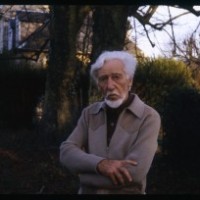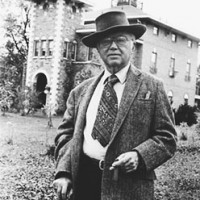Bertrand de Jouvenel: Forgotten Conservative, by Bruce Frohnen
In the disaster for humanity that was the 20th Century, dominated by the murderous dreams of collectivist ideologies and the unrestrained lust for power and the knife, those who loved liberty, be they conservative, libertarian, or “classical liberal,” recognized their common cause: opposition to ever-expanding state power. T.S. Eliot, Christopher Dawson, and Russell Kirk sought to redeem the time through recovery of our understanding of the spiritual bases of culture, and the cultural bases of ordered liberty. They were joined, in the economic sphere, by the likes of Wilhelm Roepke, but also by more secularist, market-centric thinkers like F.A. Hayek, who warned of the false appeal and disastrous consequences of following the Road to Serfdom. Yet, this sometimes uneasy partnership of defenders of cultural renewal and economic liberty included figures who sought to bridge the gap between cultural and economic thought. Such a one was Bertrand de Jouvenel, a conservative political thinker of great importance, whose writings from the middle to the second half of the 20th century deserve a wider audience than they receive.
In important works of political thought, including Sovereignty, On Power, and The Pure Theory of Politics, and also in works and essays dealing with economics and questions of how best to approach problems of public policy, Jouvenel made clear the tendency of the modern state to swallow the rest of society, and the individual with it. Ironically, Jouvenel observed, what made the state so dangerous in modern times was precisely what to most people gave to it its legitimacy: democracy. To many, this recognition of the dark side of democracy rendered Jouvenel’s thought suspect, at best. But his point was not that rule by consent is intrinsically wrong or unjust. Rather, it was that we should recognize the proper limits even of the people to act according to their will, and that such recognition is all the more important in democratic times. From recognition of the importance of the consent of the governed, modern democracy moved to the assumption that governments are legitimate to the extent that they serve the unmediated will of the majority led. Relatively early on, this overemphasis on the normative status of The People (too often little more than an abstraction) led to the common assumption that whatever a democratically elected government did was, by definition, right and just. One need only consider the French Revolutionary Reign of Terror and its claim to act for the people to see the wisdom of Jouvenel’s warning.
In a collection of lectures published as The Ethics of Redistribution, Jouvenel showed how false belief in the power of the majority to achieve a just, fair, and (especially) equal society could succeed only in feeding the Minotaur—that monstrous combination of man and beast that the modern state had become. Thinking, wrongly, that the rich had kept for themselves sufficient wealth to satisfy the needs of all, the people for generations have voted for governmental policies aimed at “redistributing” that wealth so as to meet the needs of the poor. Unfortunately, Jouvenel points out, even if one were able to confiscate all the rich had in their possession, the sum would not come close to meeting the needs of even the poorest. Thus, Jouvenel argued, the wealth “transfer” had not been, and could not be, from the rich to the poor, but rather from most of society to the state. Various programs aimed, in theory, at enriching the lives of the poor would be funded from a general tax, taking money from most people so that the government might spend it on those it deemed worthy or in need. From attempting to provide subsistence to the hungry and the cold, the state quickly moved on to funding various ideological projects, including wasteful forms of subsidized insurance and educational programs and artistic endeavors of highly questionable value, as it built an expensive administrative apparatus to determine how much to give to whom. In this manner the state became increasingly powerful and independent of any check or oversight, even as it maintained the guise and the rhetoric of a mere servant of the people.
Read the complete article in The Imaginative Conservative
Bertrand de Jouvenel: Forgotten Conservative, by Bruce Frohnen
In the disaster for humanity that was the 20th Century, dominated by the murderous dreams of collectivist ideologies and the unrestrained lust for power and the knife, those who loved liberty, be they conservative, libertarian, or “classical liberal,” recognized their common cause: opposition to ever-expanding state power. T.S. Eliot, Christopher Dawson, and Russell Kirk sought to redeem the time through recovery of our understanding of the spiritual bases of culture, and the cultural bases of ordered liberty. They were joined, in the economic sphere, by the likes of Wilhelm Roepke, but also by more secularist, market-centric thinkers like F.A. Hayek, who warned of the false appeal and disastrous consequences of following the Road to Serfdom. Yet, this sometimes uneasy partnership of defenders of cultural renewal and economic liberty included figures who sought to bridge the gap between cultural and economic thought. Such a one was Bertrand de Jouvenel, a conservative political thinker of great importance, whose writings from the middle to the second half of the 20th century deserve a wider audience than they receive.
In important works of political thought, including Sovereignty, On Power, and The Pure Theory of Politics, and also in works and essays dealing with economics and questions of how best to approach problems of public policy, Jouvenel made clear the tendency of the modern state to swallow the rest of society, and the individual with it. Ironically, Jouvenel observed, what made the state so dangerous in modern times was precisely what to most people gave to it its legitimacy: democracy. To many, this recognition of the dark side of democracy rendered Jouvenel’s thought suspect, at best. But his point was not that rule by consent is intrinsically wrong or unjust. Rather, it was that we should recognize the proper limits even of the people to act according to their will, and that such recognition is all the more important in democratic times. From recognition of the importance of the consent of the governed, modern democracy moved to the assumption that governments are legitimate to the extent that they serve the unmediated will of the majority led. Relatively early on, this overemphasis on the normative status of The People (too often little more than an abstraction) led to the common assumption that whatever a democratically elected government did was, by definition, right and just. One need only consider the French Revolutionary Reign of Terror and its claim to act for the people to see the wisdom of Jouvenel’s warning.
In a collection of lectures published as The Ethics of Redistribution, Jouvenel showed how false belief in the power of the majority to achieve a just, fair, and (especially) equal society could succeed only in feeding the Minotaur—that monstrous combination of man and beast that the modern state had become. Thinking, wrongly, that the rich had kept for themselves sufficient wealth to satisfy the needs of all, the people for generations have voted for governmental policies aimed at “redistributing” that wealth so as to meet the needs of the poor. Unfortunately, Jouvenel points out, even if one were able to confiscate all the rich had in their possession, the sum would not come close to meeting the needs of even the poorest. Thus, Jouvenel argued, the wealth “transfer” had not been, and could not be, from the rich to the poor, but rather from most of society to the state. Various programs aimed, in theory, at enriching the lives of the poor would be funded from a general tax, taking money from most people so that the government might spend it on those it deemed worthy or in need. From attempting to provide subsistence to the hungry and the cold, the state quickly moved on to funding various ideological projects, including wasteful forms of subsidized insurance and educational programs and artistic endeavors of highly questionable value, as it built an expensive administrative apparatus to determine how much to give to whom. In this manner the state became increasingly powerful and independent of any check or oversight, even as it maintained the guise and the rhetoric of a mere servant of the people.
Read the complete article in The Imaginative Conservative
Virtue and the Promise of Conservatism: the Legacy of Burke and Tocqueville, by Bruce Frohnen
Conservatism lives. It continues to exercise its power over bright young minds. It also shows us a way of life, how to live. For these assertions there could be no better evidence than Bruce Frohnen’s Virtue and the Promise of Conservatism. Conceived as a doctoral dissertation at Cornell University and midwifed by a university press, this book holds a promise of its own to find a long life on the short shelf of indispensable landmark studies of modern conservative thought. Frohnen’s fresh articulation of conservatism, telling old verities to a fin de siècle audience, does for his generation something akin to what Russell Kirk in The Conservative Mind did for his.
This phenomenon is all the more remarkable in that there is scarcely a more outré word in today’s academy than conservative. It is used almost uniformly as a term of opprobrium to castigate anything that offends against our day’s regnant intellectual orthodoxy. (Latest flash: Jeffrey Dahmer, Milwaukee cannibal, represents conservative backlash against subversions of patriarchal family.) Frohnen gives our orthodox intelligentsia something really to hate with a whole heart; this is the real thing. One can scan university-press catalogs a long time without finding a single book having the rhetoric of this one. (And it is, in passing, a wonder of wonders that a university press has allowed into print a book routinely using the generic masculine; perhaps someone there knows what our Politically Correct do not: that sometimes there is no “gender-inclusive” translation which keeps the nuances of meaning exact.)
Here is a quick sample of Frohnen’s unfashionable rhetoric. In opposition to the academy’s studied avoidance of anything religious, Frohnen avers, “To act rightly, to do as God wills in one’s own life, is to act virtuously,” and for this “[o]ne needs the guidance of revelation.” In his view, “The French Revolution, like its Marxian progeny in Russia and elsewhere, was essentially an attempt to substitute man’s will for God’s.” One who embraces the sandal of conservatism will not shrink from the scandal of the cross. But how alien will this line of thought be to my friends on the so-called Christian Left, who think that their faith requires cozying up to socialism and who look almost exclusively to the right to locate their enemies. And how this next sentence will rankle our classracegender intellectuals: “Nature dictates a hierarchical structure for society.” Why, Frohnen even resorts to the ancient imagery of the Great Chain of Being. But this move comes readily to one who thinks that, “rather than trusting independent wisdom, we should trust the wisdom of the ages.”
Read the complete article in The University Bookman
Russell Kirk on Cultivating the Good Life, by Bruce Frohnen
When Russell Kirk passed away he was surrounded by his loving family, in the house he built on his ancestral land. This was fitting for a man who always wished to lead a life of “decent independence.” He had sought to provide for his family while remaining free from compromising entanglements. He did not want gratitude to some benefactor to cloud his judgment or tempt him to defend the “Permanent Things” with less than his full vigor.


